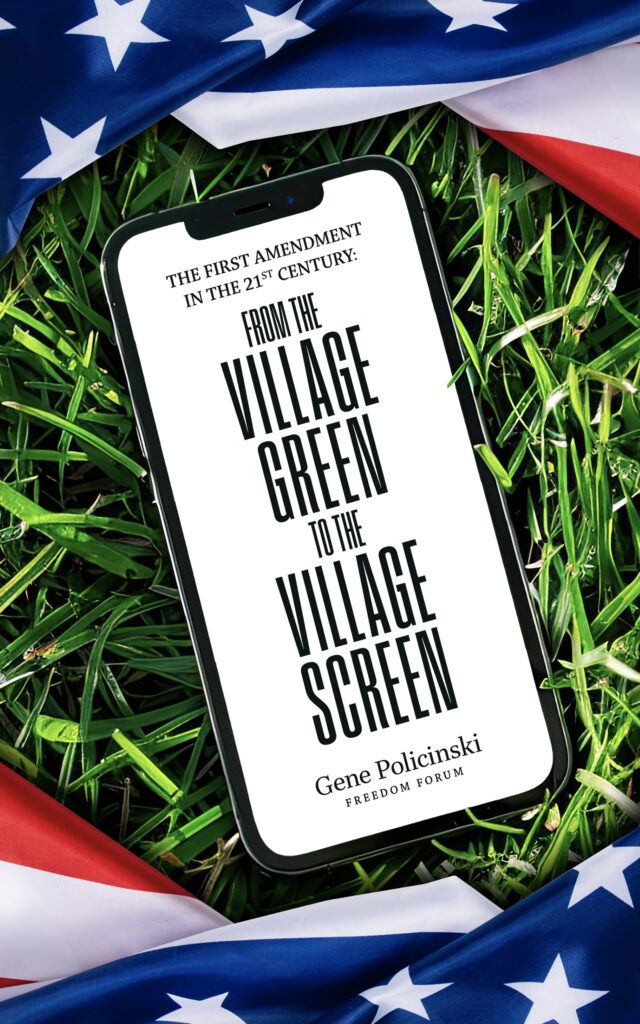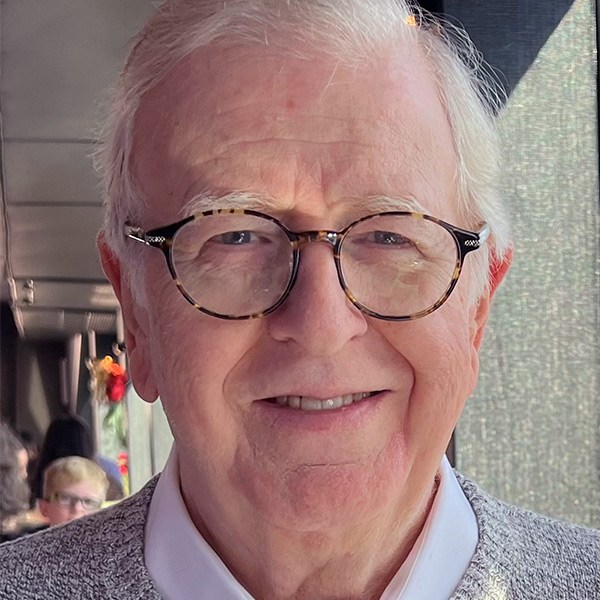The First Amendment in the 21st Century
From the Village Green to the Village Screen

A Fast-Paced, Free History Book of the First Amendment
Download to read on your device:
Listen on your device from:
This fast-paced history of the First Amendment will engage students, educators, scholars and other fans of our nation’s most fundamental freedoms.
The First Amendment’s five freedoms of religion, speech, the press, assembly and petition were once philosophical ideas exercised in the debate and dissent of colonial Village Greens.
Today, they’re not only constitutional rights but also core American values facing new challenges in the dynamic, turbo-charged flow of information on today’s digital Village Screens.
Throughout its history, the application of and very need for protecting the First Amendment’s five freedoms have been at issue.
In “The First Amendment in the 21st Century,” Gene Policinski, Freedom Forum senior fellow for the First Amendment and past First Amendment Center president, traces the history of the First Amendment through its winding social and legal paths as it has intertwined with world events and cultural change.
He explores how this history shows today’s potential for a First Amendment renaissance even amid new technological challenges.
Deeply researched and clearly written, “The First Amendment in the 21st Century” reconciles the past and the present and opines on the future of our First Amendment freedoms — from the courtroom to the chat room.
“A valuable, timely contribution for students and the public, including me.”
— Mary Beth Tinker, Tinker v. Des Moines plaintiff and First Amendment educator
“‘Village Green’ takes the reader on a rich, fast-paced trip through First Amendment history: Where we started, how we got there and where we’re going. This will be an excellent resource for all.”
— Nadine Strossen, First Amendment scholar and author, Free Speech: What Everyone Needs to Know (2023)
“In this brilliantly efficient book, Gene Policinski encapsulates the 200-year legal history of The First Amendment [and] gives the busiest of readers an understanding of how the court has shaped the right that distinguishes democracy.”
— Robert D. Bickel, professor emeritus, the First Amendment and Civil Rights History, Stetson University
“[A]a highly readable account of the First Amendment’s practical impact on everything from religious practice to civil rights activism to a high school cheerleader’s social media posts. … Arriving at a critical moment in the national debate over speech, publications and protests, Policinski’s writing should serve as a baseline for understanding what rights the Founding Fathers truly intended in the 45 words of the First Amendment.”
— Joie Chen, Emmy Award-winning television journalist
Gene Policinski is available to talk virtually with your group or book club about “The First Amendment in the 21st Century: From the Village Green to the Village Screen.”
Reach out to [email protected] to find out his availability and book your event.
Content
Section I: How We Got Here
Establishing First Amendment Freedoms: The history of the First Amendment began long before it was enshrined in the Bill of Rights. Learn about the historic inspirations for the five freedoms, from the Magna Carta to early colonial writings.
At First, ‘No Law’ Meant Just That (Mostly): Among the first challenges in the history of the First Amendment were early wartime actions to prevent sedition. Among the first major movements in the history of the First Amendment was antislavery speech and activism before and during the Civil War. But it wasn’t until the Constitution and the courts said government at all levels must abide by the First Amendment that its values became engrained — and widely tested.
The Transition Begins: Deciding On the Limits, Protections for Use of the Five Freedoms: Through two world wars, the Civil Rights Movement, fears of communism abroad and at home, and the invention and spread of media forms like TV and the movies, the 20th century saw First Amendment history explode with new questions about, challenges to and uses of its freedoms. Lawmakers and the courts took note of swiftly changing social and cultural context in interpreting and applying the freedoms — sometimes thwarting change and sometimes embracing it.
“Third Wave” First Amendment Doctrine: The onset of the 21st century marked a new, third era in the history of the First Amendment. The infant internet posed new questions. Perhaps as significant, First Amendment law and scholarship turned toward challenges around carving out exceptions to First Amendment protections.
Section II: Where We Are Now
Internet Speech: As private online platforms rather than public squares became a primary place for social discourse, questions around how to apply First Amendment freedoms to internet companies and users outpaced legal answers.
Supreme Court Cases 2017 to Today: The most recent cases at the high court have weighed competing rights and values in cases where freedoms and viewpoints collided, often providing incremental answers that have raised new questions or drawn new lines between freedoms in tension.
Section III: Future Challenges to Our Freedoms
From information privacy and AI-generated content to growing threats to a free press and to public protest and discourse, the 45 words face a new 21st century challenge: us.
About the Author
 Gene Policinski is the senior fellow for the First Amendment at Freedom Forum, where he writes, lectures and speaks on an array of First Amendment topics. His work often focuses on press freedom and free speech issues, including whistleblower protections, data privacy and the intersection of news coverage and courts. He regularly contributes to Freedom Forum’s website, has been published in several law review journals, and wrote a chapter on press freedom in the American Bar Association book “Whistleblowers, Leaks and the First Amendment.” Since arriving at Freedom Forum in 1996, Policinski has served in many roles including as executive director of the First Amendment Center, president of the Diversity Institute and chief operating officer of the Freedom Forum Institute, among others. He was a founding editor of USA TODAY.
Gene Policinski is the senior fellow for the First Amendment at Freedom Forum, where he writes, lectures and speaks on an array of First Amendment topics. His work often focuses on press freedom and free speech issues, including whistleblower protections, data privacy and the intersection of news coverage and courts. He regularly contributes to Freedom Forum’s website, has been published in several law review journals, and wrote a chapter on press freedom in the American Bar Association book “Whistleblowers, Leaks and the First Amendment.” Since arriving at Freedom Forum in 1996, Policinski has served in many roles including as executive director of the First Amendment Center, president of the Diversity Institute and chief operating officer of the Freedom Forum Institute, among others. He was a founding editor of USA TODAY.
About Freedom Forum
Freedom Forum’s mission is to foster First Amendment freedoms for all. Each year, we engage thousands of Americans with stories, conversations and celebrations of these essential rights. Freedom Forum is a nonpartisan 501(c)3 private operating foundation.